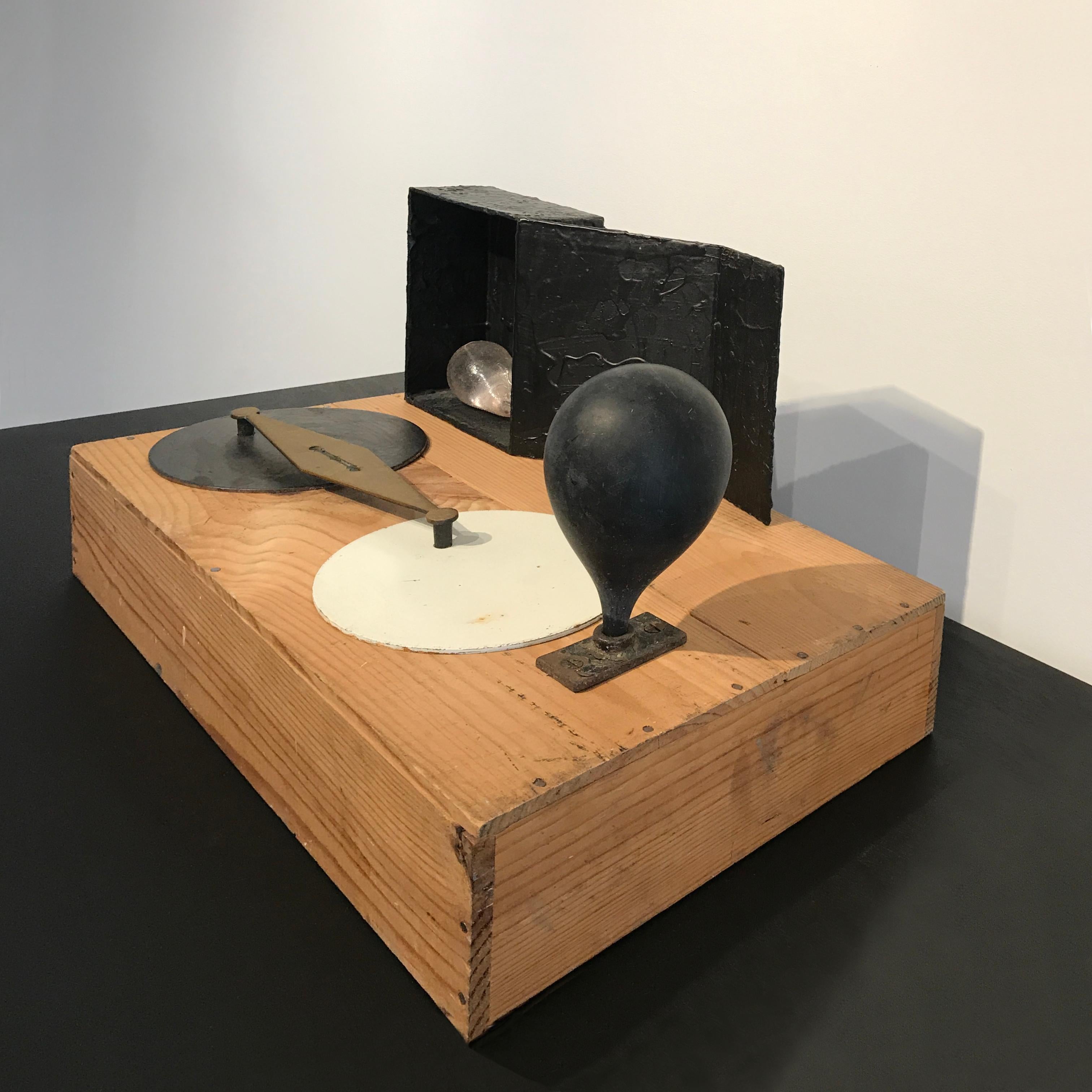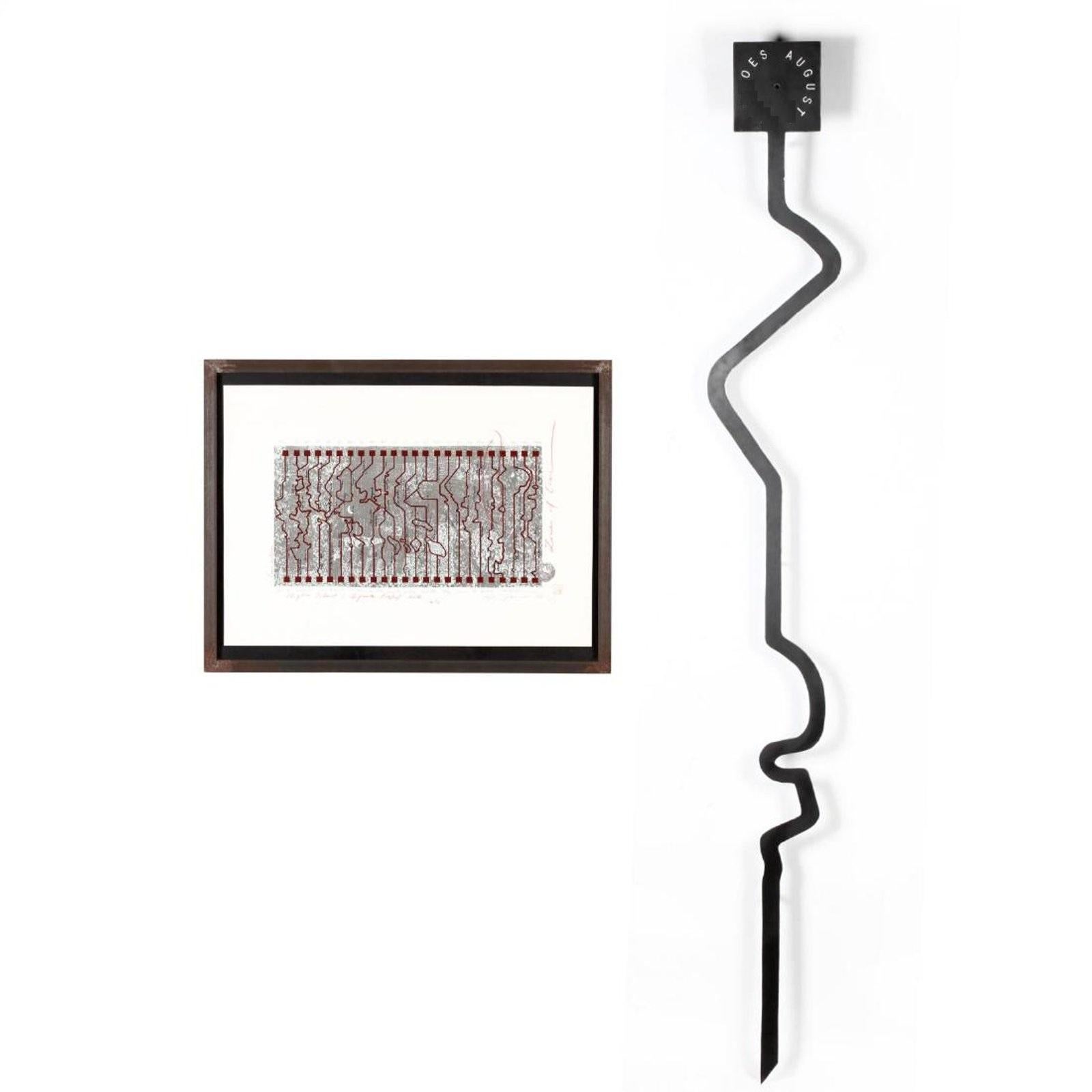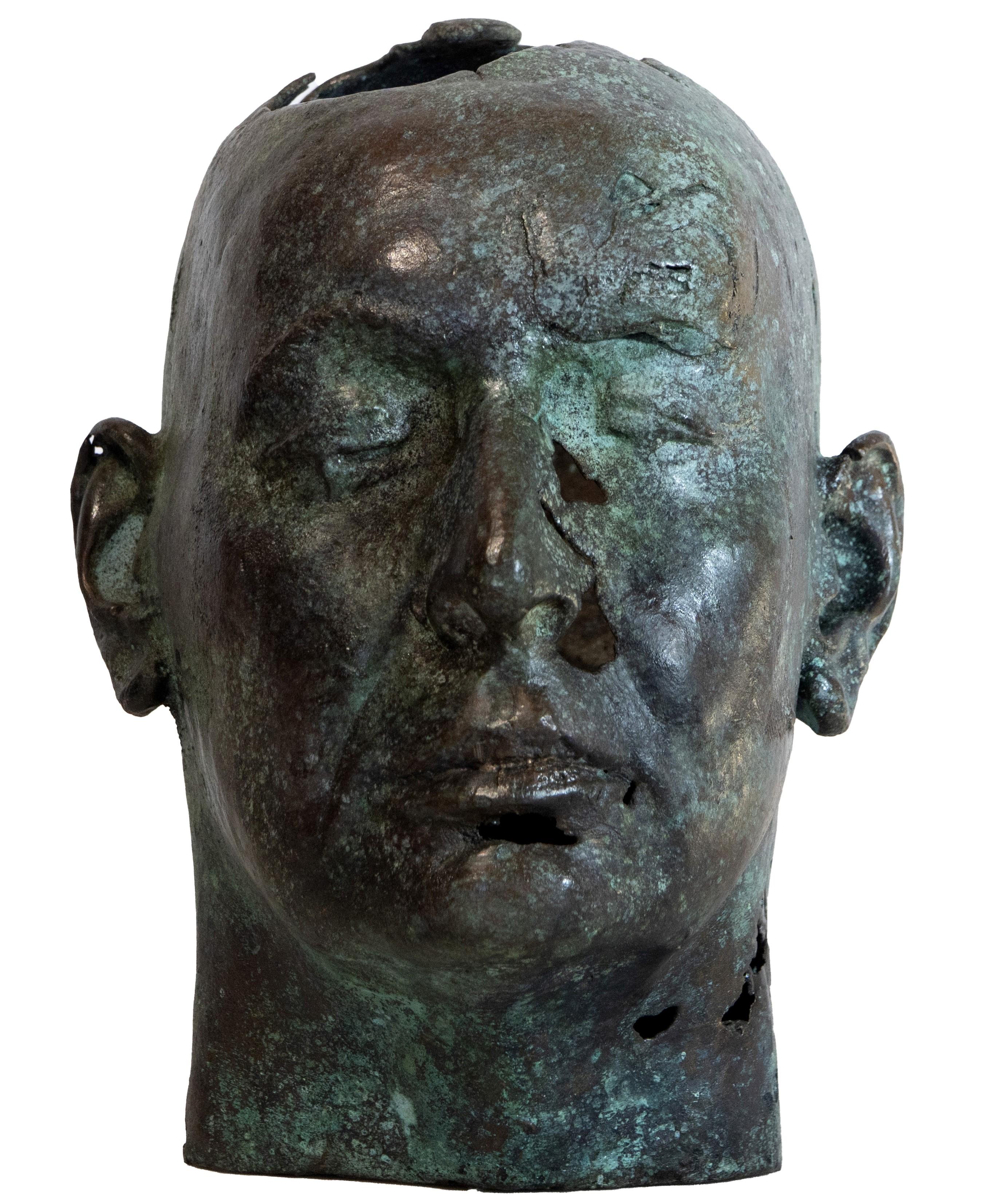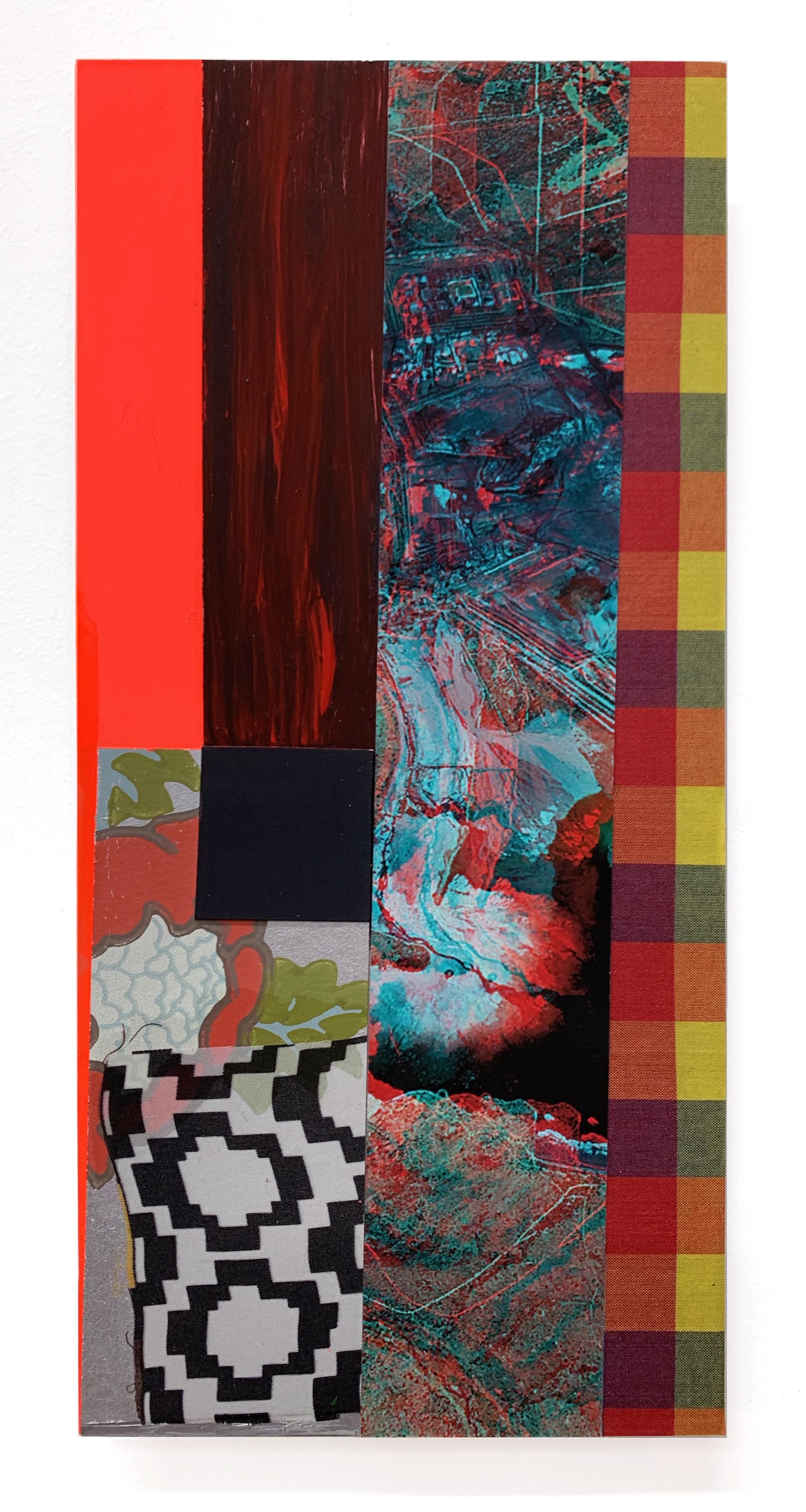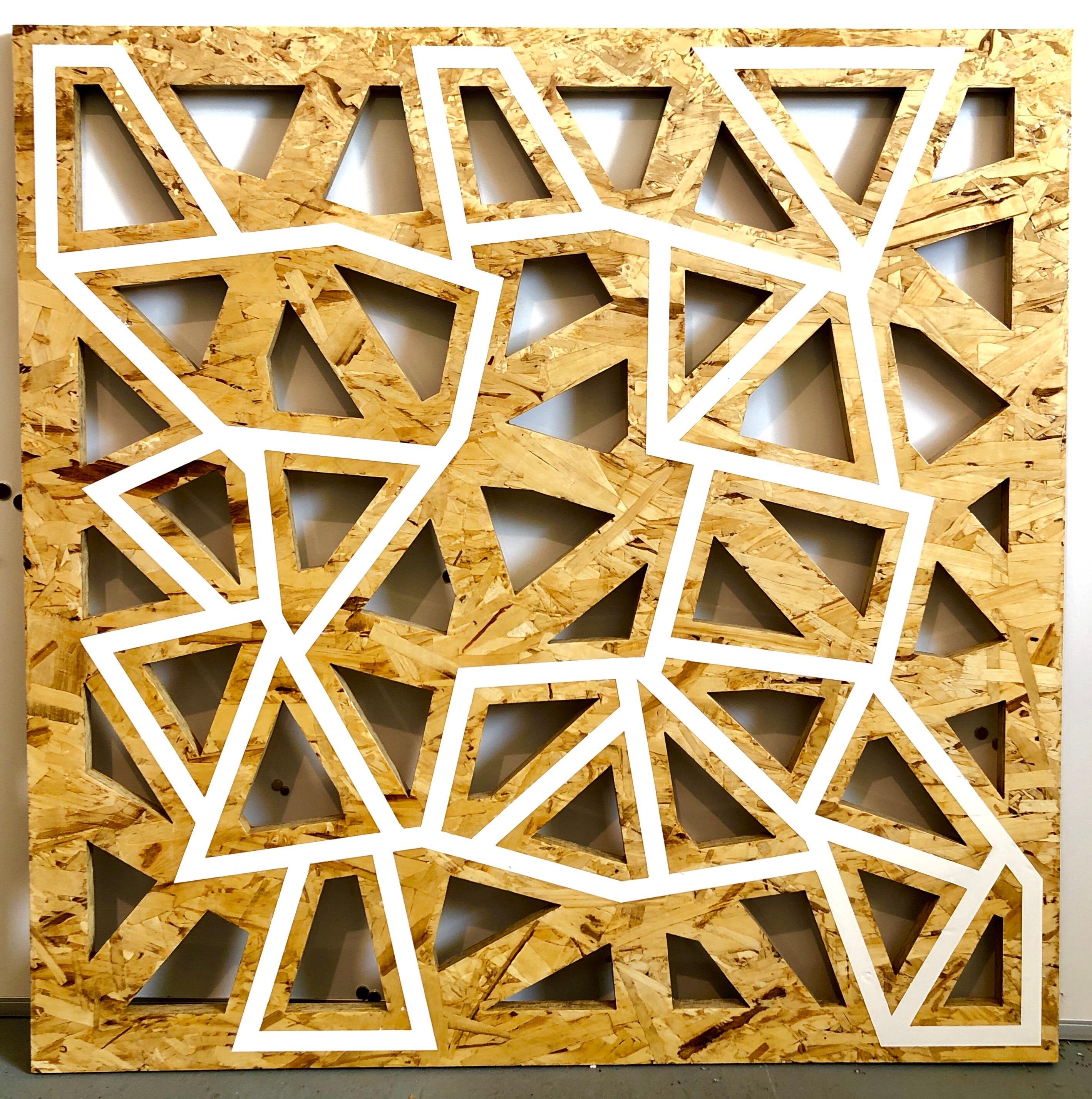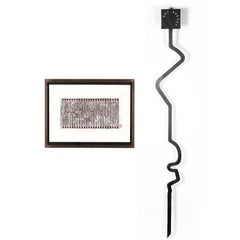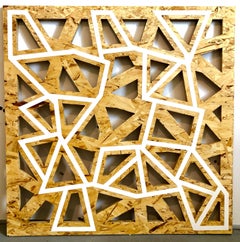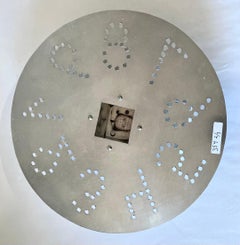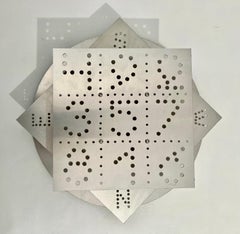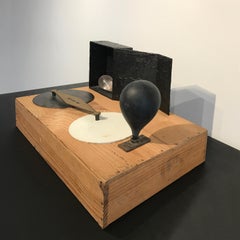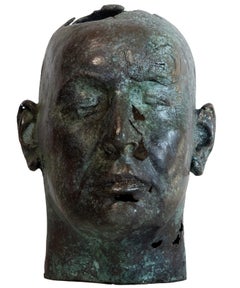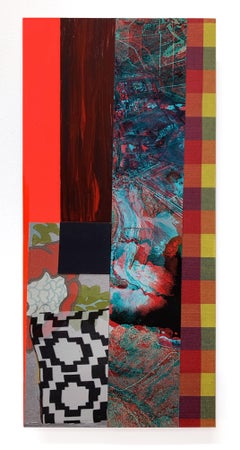Items Similar to Rare Museum Judaica Israeli Menorah Candelabra Sculpture Reddish Studio Tel Aviv
Want more images or videos?
Request additional images or videos from the seller
1 of 13
Reddish StudioRare Museum Judaica Israeli Menorah Candelabra Sculpture Reddish Studio Tel Aviv2008
2008
$5,500
£4,188.76
€4,821.82
CA$7,881.94
A$8,623.90
CHF 4,449.91
MX$103,270.27
NOK 56,493.69
SEK 52,929.14
DKK 36,009.02
About the Item
Reddish Studio
Naama Steinbock and Idan Friedman
Candlestick United
2008
Handmade and limited edition menorah
colored cast iron frame, found candlesticks
Each one off (these are each unique)
Limited Edition Chanukah Menorah
Dimensions: 28 x 49 x 8.5 cm (11 x 19 1/4 x 3 3/8 in.); weight: 6.450 kg,
Hand signed underneath base
Provenance: Tiroche, Herzliya, Israel, July 7, 2012, lot 137 (it sold for 4140$)
A Hanukah Menorah from the series was sold on May 2010 at Dorotheum, Vienna, for 5,381 EUR.
Exhibited:
Reinventing rituals, Contemporary Jewish Museum, San Francisco, CA, April- Oct, 2010
Reinventing Ritual: Contemporary Art and Design for Jewish Life, The Jewish Museum, New York, NY, 2009
Judaica Twist, Beit Hatfutsot, Tel Aviv, Israel, 2009
LITERATURE
500 Judaica: Innovative Contemporary Ritual Art, (Asheville: Lark Books, 2010), illustrated inside and on verso.
A pair of Shabbat candlesticks from the series was bought for the permanent collection of the Jewish Museum in Berlin.
A pair of Shabbat candlesticks from the series was given as a prize of "comprehension and tolerance" to the Chancellor of Germany Angela Markel by the Jewish Museum in Berlin.
A Hanukah Menorah from the series was bought for the permanent collection of the Jewish Museum in New-York
Reddish Studio, Modern Israeli design, Contemporary Judaica, Menorah, Conceptual design, Minimalist Judaica, Hanukkah lamp, Studio Reddish menorah, Collectible Judaica.
There has been a resurgence of fine artists making Judaica, There was initial generation of the Bezalel School in Jerusalem and later Ludwig Wolpert, whose spare, geometric, functionalist style was influenced by the Bauhaus school in particular and modernism in general, Moshe Zabari, Maxwell Chayat, in New York, Menachem Berman, Zelig Segal and others in Jerusalem and Tel Aviv Today in addition to fine artists such as Yaacov Agam, Menashe Kadishman and Tobi Kahn there are artists from the Bay Area, California such as Harriete Estel Berman, Aimee Golant and Lisa Rauchwerger. Anika Smulovitz, A metalsmith and professor at Boise State University, Paula Newman Pollachek, A silversmith who creates pieces that mix art and function for family ritual.
Jeanette Kuvin Oren, A fabric artist known for her site-specific fabric art in synagogues and Jewish organizations. Idelle Hammond-Sass, A jeweler from Ann Arbor, Michigan, who creates intimate Judaica such as eternal lights, menorahs, and tzedakah boxes.
Lynne Avadenka: An artist living in Huntington Woods, Michigan, whose work engages with Jewish texts, history, and ritual. Hillel Smith: A graphic artist who creates reimagined Judaica in forms like concert posters and dreidels. Cynthia Eid and Deborah Rolnik Raichman, A Texas-based artist known for her mosaic and ketubah works. As well as Avner Moriah: An Israeli artist who creates art based on biblical texts. Tamar Paley: A jeweler/designer living in Jerusalem who creates wearable ritual objects for women.
- Creator:Reddish Studio (Israeli)
- Creation Year:2008
- Dimensions:Height: 11 in (27.94 cm)Width: 19.75 in (50.17 cm)Depth: 3.38 in (8.59 cm)
- Medium:
- Movement & Style:
- Period:
- Condition:minor wear. please see photos.
- Gallery Location:Surfside, FL
- Reference Number:1stDibs: LU38217095992
About the Seller
4.9
Platinum Seller
Premium sellers with a 4.7+ rating and 24-hour response times
Established in 1995
1stDibs seller since 2014
1,819 sales on 1stDibs
Typical response time: 1 hour
- ShippingRetrieving quote...Shipping from: Miami, FL
- Return Policy
Authenticity Guarantee
In the unlikely event there’s an issue with an item’s authenticity, contact us within 1 year for a full refund. DetailsMoney-Back Guarantee
If your item is not as described, is damaged in transit, or does not arrive, contact us within 7 days for a full refund. Details24-Hour Cancellation
You have a 24-hour grace period in which to reconsider your purchase, with no questions asked.Vetted Professional Sellers
Our world-class sellers must adhere to strict standards for service and quality, maintaining the integrity of our listings.Price-Match Guarantee
If you find that a seller listed the same item for a lower price elsewhere, we’ll match it.Trusted Global Delivery
Our best-in-class carrier network provides specialized shipping options worldwide, including custom delivery.More From This Seller
View AllMIxed Media Conceptual Art Sculpture Drawing Human Rights Welded Iron
By Francoise Schein
Located in Surfside, FL
This is a large sculpture and also includes an artist custom framed silkscreen with extensive handwork titled Line of Time, pencil signed and inscribed, presented in heavy metal and wooden frame (framed piece 24.5 x 30 in., sculpture piece is about 94 X 11 inches)
Francoise Schein is a visual artist, trained as an architect - urban planner; She also teaches art at the ESAM Higher School of Arts and Media in Caen in Normandy . She is the founder of the INSCRIRE Association.
In 2016, she was elected member of the Royal Academy of Sciences, Arts and Fine Arts of Belgium.
Group Exhibitions
Spain: 2016, The "5Contemporary" Paris gallery presented a group show at the Museum of Contemporary Art of Genalguacil, Spain. The show included important artists such as Françoise Schein, Mimouni and Pedro Castrortega.
Born in Brussels , Françoise Schein left Belgium after studying architecture at the higher institute of architecture of the French community - La Cambre where she wrote her thesis on fundamental rights, then studied urban design at the Columbia University in the City of New York . She lived 11 years in New York where she begins a work on cartography territories. Subway map Floating on NY Sidewalk is his first monumental urban sculpture located at 110 Greene Street in SoHo (1985). At that time her works are abstract landscapes of cities, made up of networks, lines, trajectories, territories, founding texts and stories. They are constructed of very diverse materials and light.
Returning back to Europe in 1989, she continues to work on what she calls her drawings-laboratories while beginning to integrate works in cities on civic themes, the main ones: at the Concorde metro station in Paris in 1991 and then in Brussels, Saint-Gilles , in 1992, these two projects took her to Lisbon in 1993 where she lived for five years and produced two monumental works (in azulejos) for the city of Lisbon at Parque metro station ( 1994) and another for the city of Stockholm at the Universitetet station (1998). She continues to travel to cities where she builds successively projects in Haifa , on the facade of the Beth Hagefen Jewish-Arab Cultural Center with Michel Butor (1994). Then she lives in Berlin where she builds the Westhafen station (2000) which takes her to Bremen to make her first human rights park, Rhododendronpark (2002). In 2005, she made the monumental Time Zone Clock in Coventry in 2005. Since 1999, she has also settled in Rio de Janeiro and initiated participatory artistic projects with the underprivileged population of the favelas . Since then, with the help of a locally trained team, many projects have been carried out, including one in Copacabana and more than 20 in different favelas (from 1999 to 2016). These works transformed the Rio workshop into sustainable development for the people who invested it. In Sao Paulo, since 2009, Françoise Schein has produced a monumental work with the participation of 1000 young people from the favela schools at Luz subway station.
Her work is monumental recalling the works of Christo, Maria Dompe, Christian Boltanski, Anish Kapoor, Ai Wei Wei...
Category
Late 20th Century Conceptual Abstract Sculptures
Materials
Iron
Alkyd Enamel Oil Painting Half A Thought Cut Panel Wall Hanging Modern Sculpture
By Peter Wegner
Located in Surfside, FL
Oil-based alkyd enamel on plywood panel with cuts. this is a cut plywood wall relief sculpture with paint on it. This has an architectural quality to it.
Peter Wegner (born 1963) i...
Category
21st Century and Contemporary Conceptual Abstract Paintings
Materials
Enamel
Russian Samizdat Art Conceptual Photo Sculpture Assemblage Gerlovin & Gerlovina
Located in Surfside, FL
Rimma Gerlovina and Valeriy Gerlovin
Clock, 1987-94
Aluminum sculpture, mixed media and c-print photograph construction, c-print, felt tip marker
13 h × 13 w × 4 d in (30 × 30 × 6 cm)
Rimma Gerlovina and Valeriy Gerlovin were founding members of the underground conceptual movement Samizdat in the Soviet Union, described in their book Russian Samizdat Art. Based on a play of paradoxes, their work is rich with philosophic and mythological implications, reflected in their writing as well. Their book Concepts was published in Russia in 2012. The work by Rimma Gerlovina and Valeriy Gerlovin is emphatically contemporary. The artist couple were part of the Moscow Conceptualists, their performance Costumes, from 1977, deepened their ongoing work with linguistic semiotic systems and their own bodies. Considering the context in which Gerlovina and Gerlovin made their work—that of political restrictions on public life, of unfreedom, and censorship—their collaborative togetherness must also be read as a space of possibility for political community and resistance. Rimma Gerlovina’s hair is featured prominently in the art of the Gerlovins as a constructing element of the body. Used for the linear drawings her braids transmit transpersonal waves reminiscent of an aura of live filaments. Long loose hairs function as threads of life; streaming in abundance, they allude to Aphrodisiac vitality and Samsonian strength. On the other hand, they are the haircloth worn during mourning and penitence. In New York they continued to make sculptural objects, and their photographic projects grew into an extended series called Photoglyphs. In their photographs, they use their own faces to explore the nature of thought and what lies beyond it. Since coming to the United States in 1980, they had many exhibitions in galleries and museums including the Art Institute of Chicago. The New Orleans Museum of Art launched a retrospective of their photography, which traveled to fifteen cities. Group exhibitions include the Venice Biennale, the Guggenheim Museum, New York, Smithsonian National Museum of American Art, Washington D.C., Bonn Kunsthalle, Germany, Tokyo Metropolitan Museum of Photography, State Tretyakov Gallery, Moscow, and others.
Samizdat or “self-published” began in the Soviet Union, and Samizdat art consists mainly of books and magazines published and distributed by the artists who made them. Samizdat art has sources in the innovative books and magazines turned out by the early 20th century Russian avant-garde—artists and writers like Olga Rozanova, Vladimir Mayakovsky, El Lissitzky, and Alexander Rodchenko.
Artists as varied as Alexander Archipenko, Leon Bakst, Marc Chagall, Naum Gabo, Alexandra Exter...
Category
1980s Conceptual Figurative Photography
Materials
Metal
Russian Samizdat Art Conceptual Compass Sculpture Assemblage Gerlovin, Gerlovina
Located in Surfside, FL
Rimma Gerlovina and Valeriy Gerlovin
Compass, 1988
Aluminum sculpture, mixed media and c-print photograph construction, c-print, felt tip marker
12.5 h × 12.5w × 4 d in (30 × 30 × 6 cm)
Rimma Gerlovina and Valeriy Gerlovin were founding members of the underground conceptual movement Samizdat in the Soviet Union, described in their book Russian Samizdat Art. Based on a play of paradoxes, their work is rich with philosophic and mythological implications, reflected in their writing as well. Their book Concepts was published in Russia in 2012. The work by Rimma Gerlovina and Valeriy Gerlovin is emphatically contemporary. The artist couple were part of the Moscow Conceptualists, their performance Costumes, from 1977, deepened their ongoing work with linguistic semiotic systems and their own bodies. Considering the context in which Gerlovina and Gerlovin made their work—that of political restrictions on public life, of unfreedom, and censorship—their collaborative togetherness must also be read as a space of possibility for political community and resistance. Rimma Gerlovina’s hair is featured prominently in the art of the Gerlovins as a constructing element of the body. Used for the linear drawings her braids transmit transpersonal waves reminiscent of an aura of live filaments. Long loose hairs function as threads of life; streaming in abundance, they allude to Aphrodisiac vitality and Samsonian strength. On the other hand, they are the haircloth worn during mourning and penitence. In New York they continued to make sculptural objects, and their photographic projects grew into an extended series called Photoglyphs. In their photographs, they use their own faces to explore the nature of thought and what lies beyond it. Since coming to the United States in 1980, they had many exhibitions in galleries and museums including the Art Institute of Chicago. The New Orleans Museum of Art launched a retrospective of their photography, which traveled to fifteen cities. Group exhibitions include the Venice Biennale, the Guggenheim Museum, New York, Smithsonian National Museum of American Art, Washington D.C., Bonn Kunsthalle, Germany, Tokyo Metropolitan Museum of Photography, State Tretyakov Gallery, Moscow, and others.
Samizdat or “self-published” began in the Soviet Union, and Samizdat art consists mainly of books and magazines published and distributed by the artists who made them. Samizdat art has sources in the innovative books and magazines turned out by the early 20th century Russian avant-garde—artists and writers like Olga Rozanova, Vladimir Mayakovsky, El Lissitzky, and Alexander Rodchenko.
Artists as varied as Alexander Archipenko, Leon Bakst, Marc Chagall, Naum Gabo, Alexandra Exter...
Category
1980s Conceptual Figurative Photography
Materials
Metal
Gentleman, Marble and Travertine Conceptual Sculpture
By Maria Dompe
Located in Surfside, FL
MARIA DOMPE, (Italian, b. 1958), Gentleman Sculpture, marble and travertine, 1995, height: 20 in.
One of a pair, (Gentleman and Lady) being sold separately.
Maria Dompe was born in ...
Category
Late 20th Century Conceptual Abstract Sculptures
Materials
Travertine, Marble
Lady, Marble and Fabric Conceptual Abstract Sculpture Maria Dompe
By Maria Dompe
Located in Surfside, FL
MARIA DOMPE, (Italian, b. 1958), Lady Sculpture, marble and fabric, 1995, height: 14 in.
One of a pair, (Lady and Gentleman) being sold separately.
Maria Dompe was born in Fermo on ...
Category
Late 20th Century Conceptual Abstract Sculptures
Materials
Marble
You May Also Like
Sculpture, abstract record player: 'Kristallo'
By Kelly Bugden + Van Wifvat
Located in New York, NY
The artistic collaboration of Kelly Bugden + Van Wifvat has produced a thought-provoking body of sculptures, paintings, and constructions. Nature, childhood memories, and everyday ar...
Category
2010s Conceptual Abstract Sculptures
Materials
Brass, Steel
Hyperrealistic Bronze Female Head Lost-Wax Sculpture, Hollow Skull, Contemporary
Located in FISTERRA, ES
Hyperrealistic bronze female head sculpture with hollowed skull evokes mystery and organic patina. Soño (24 × 17 × 22 cm) by Aldonza is cast by the artist using the traditional lost-...
Category
2010s Conceptual Figurative Sculptures
Materials
Bronze
Limpopo, 2021
By Michael Davis
Located in Palm Desert, CA
Style: Contemporary, Modern, Conceptual
Small study for the series “Rare Earth"
Category
21st Century and Contemporary Conceptual Abstract Sculptures
Materials
Metal
$960 Sale Price
20% Off
Abstraction About Subtle
By Krzysztof Sokolovski
Located in Lake Worth Beach, FL
Abstraction About Subtle
Royal blue with gold leaf on carved wood panel.
Krzysztof (Chris) Sokolovski born in 1985 in Eisiskes in Lithuania. Visual artist creating neosacral art: pa...
Category
2010s Conceptual Abstract Sculptures
Materials
Gold Leaf
Abstract wood Sculpture: "Fortress'
By Kelly Bugden + Van Wifvat
Located in New York, NY
The artistic collaboration of Kelly Bugden + Van Wifvat has produced a thought-provoking body of sculptures, paintings, and constructions. Nature, childhood memories, and everyday ar...
Category
2010s Conceptual Abstract Sculptures
Materials
Wood, Paint
Monocromo rojo quemado
By Eduardo Costa
Located in Mexico City, CDMX
Eduardo Costa is one of the key figures in global conceptual art. He was born in Buenos Aires in 1940. He graduated in Literature and Art at the University of Buenos Aires in 1965 where he took courses with Jorge Luis Borges in the late fifties. His practice developed into Conceptual POP with the Fashion Fictions Series, 1966-to the present. He is also credited with creating Conceptual Geometry which he showed internationally starting in 1995 at the Elga Wimmer Gallery, NY, and in 2001 at Cecilia de Torres LTD., NY. With Cecilia de Torres he exhibited a fully developed edition of his Volumetric Paintings, which use painting to such a volume that it stands by itself without any cloth or other support.Eduardo Costa lived twenty-five years in New York and over four years in Rio de Janeiro where he met almost daily with Hélio Oiticica, Lygia Pape...
Category
2010s Conceptual Abstract Sculptures
Materials
Acrylic
